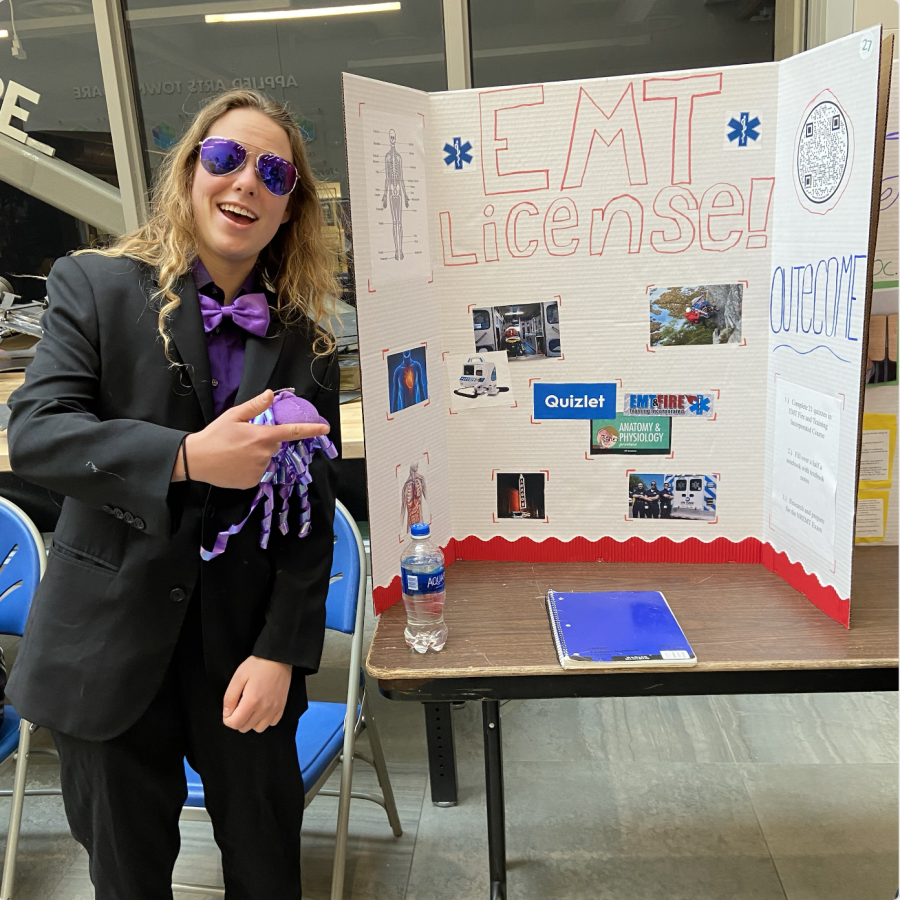Senior prepares for next adventure
Senior Meg Denberg aims to become Emergency Medical Technician by college
Denberg at the Senior Project Exhibition on May 18, sharing how she researched and prepared for the EMT certification exam
As Meg Denberg prepares for graduation, she has been chasing her next adventure.
Denberg is vying to work in an ambulance while concurrently attending college in the fall. For that to happen, she must become a certified Emergency Medical Technician.
She used her Senior Project to begin the certification process, which she aims to complete by the end of the summer.
During the four weeks of Senior Project, Denberg started an asynchronous course, sometimes spending twelve hours a day reading a textbook, watching videos, and taking quizzes. The course qualifies her to take the National Registry Emergency Medical Technician Exam.
In the fall, Dengerg will attend the University of California, Santa Cruz, to study education. She has worked as a camp counselor at the Wilmette Park District for the past two years.
“It’s the only job I’ve ever had, and [it] is the best job in the world,” said Denberg.
When Denberg graduates from college, she plans on teaching in developing countries such as Liberia. Her EMT certification makes her “more qualified” for that.
Denberg said that should she switch majors by sophomore year, her experience as an EMT would provide her with an “honest reflection” on whether she wants to head down an adventurous path, such as a river guide or firefighter.
While Denberg acknowledged that she undertook a “pretty intense project,” it helped prepare her for the rigor of college.
“The structure of my Senior Project mimics college where it’s all my own timing, all my own motivation, [and] it’s harder material,” said Denberg.
Throughout the course, Denberg constantly readjusted her schedule, depending on if it was before, during, or after AP exams. This experience has taught her how to study more effectively and to recognize and stop burnout.
“I [would have] coffee and keep reading. Now, I’m taking [a] step back and [seeing] that’s not the most efficient way to [study],” said Denberg.
As she works through her textbook, some information has been “common sense,” such as don’t crash an ambulance, wash your hands, and take care of yourself. However, after a while, she got what she came for.
“It’s a lot of work, but I’m starting to get to the point where I feel like I’m really becoming smarter,” said Denberg.
Denberg has learned more about the complexity of the human body.
“Even just reading about my heart, knowing my heart is beating, and doing all of these things a billion times every minute, is crazy,” said Denberg.
During Senior Project, students have a Community Sponsor, who is an expert in their project, whom they meet twice a week with. Denberg’s sponsor is a paramedic, who is a family friend. They have helped her understand the content and stay on track.
At the end of Senior Project, students present their work at an exhibition. Denberg thought about making a “generic” poster but may also show her notebook.
“[I have been] taking pages and pages of notes each day. … I’m writing term [after] term,” said Denberg.
Denberg encourages future seniors to go on Senior Project unless they are “concerned” about AP exams.
“[Senior Project] gives you ample time to explore [your hobby],” said Denberg.







































